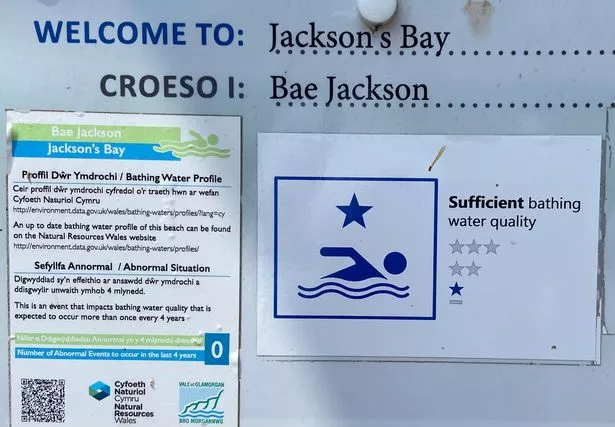Concerns are mounting over the increasing levels of bacteria associated with sewage pollution found in the waters of Barry Island’s popular beaches in Wales. Previously known for its pristine conditions and prestigious Blue Flag status, Whitmore Bay has seen a decline in water quality from “Excellent” to “Good.” Nearby Jackson’s Bay has experienced an even greater drop, reaching a “Sufficient” rating and facing the risk of further deterioration to a “Poor” classification.
To address this issue, Natural Resources Wales (NRW) and the Vale of Glamorgan Council have joined forces in a collaborative effort. They aim to gather more comprehensive data on rainfall, river levels, UV radiance, and sampling techniques to understand the factors affecting the beaches and provide bathers with information on predicted water quality during the summer season from mid-May to the end of September. This initiative aims to enable authorities to anticipate short-term pollution events that could impact Whitmore Bay and Jackson’s Bay.

Currently, water sampling is conducted three to four times a month throughout the summer, focusing on two types of bacteria associated with sewage pollution: intestinal Enterococci and Escherichia coli. The data consistently show the presence of these bacteria at both beaches, with occasional spikes. Last year, Whitmore Bay experienced a significant spike during sampling on August 30, while Jackson’s Bay saw a similar increase a few weeks later on September 14.
Despite efforts to determine the cause, authorities remain uncertain. Welsh Water’s data on untreated sewage outflows during periods of heavy rainfall have sparked controversy, as they do not indicate substantial outflows in the Barry area. However, the River Cadoxton, which affects both beaches, drains a large catchment area encompassing residential estates and heavy industries. After heavy rainfall, the river’s water quality is reportedly diminished due to sewage or industrial runoff from upstream locations within its catchment.
Visual inspections have provided some clues. According to the environment.data.gov.uk website, samplers have occasionally discovered traces of sewage debris at Jackson’s Bay, ranging from 10% to 20% of visits. Additionally, minor amounts of animal feces and litter have been observed at the bathing site, with greater quantities present on an additional 10% to 20% of occasions.
- An 800-year law was enacted after a bottlenose dolphin washed up on Welsh beach
- Man outraged after being reported to trading standards for bizarre reason
- 11 Wales hopefuls are facing Judgement Day auditions for Japan tour
- Woman, 37, from Cardiff goes missing as two people arrested
- Controversial plans that will allow Stevie Wonder and Alanis Morisette to play at Cardiff park updated
Jackson’s Bay, connected to Whitmore Bay in Barry, is a popular destination for paddle boarders and dog-friendly beachgoers who often witness dogs playing in the sand or swimming in the sea.
The “sufficient” water quality rating at Jackson’s Bay deters some visitors from entering the water. Bathers Pam and Heather expressed reluctance to swim upon learning of the rating, with Pam stating, “We would want all the beaches in Wales to be clean. I would have been eager to swim if the water quality were better.”
However, not everyone is discouraged. Laura, a regular swimmer, mentioned that the water at Jackson’s Bay appears clean, although it can occasionally be murky and contain litter, depending on the weather. Laura does not let the water quality rating affect her decision to swim, explaining, “If it were visibly polluted, then I would think twice, but since it isn’t, I don’t mind.”
An NRW spokesperson addressed the issue, stating, “Given the complex urban catchment in Barry, we cannot definitively pinpoint the cause of these high results. However, these are the primary sources of pollution that could impact water quality: sewage pollution, water runoff from farms, animal and bird feces on or near beaches, and water drainage from populated areas after heavy rain. Misconnected drains and poorly maintained septic tanks can also contribute to domestic sewage pollution in surface water systems.”
NRW and the Vale of Glamorgan Council remain optimistic that their pollution monitoring project will yield positive results. Fiona Hourahine, Operations Manager for NRW, expressed